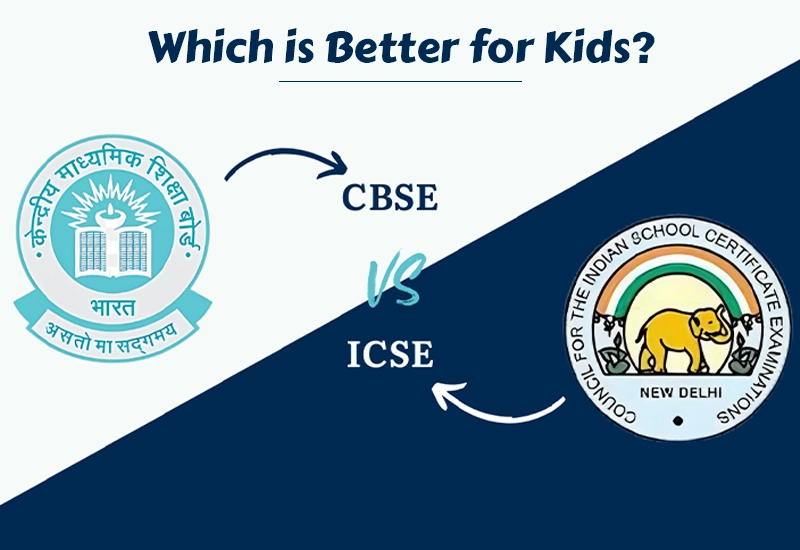As a parent, one of the most important choices you will have to make is which school board to send your child to. People in India talk about ICSE and CBSE the most when it comes to education boards. Even though they are all well-known, each one has its own pros and cons that could affect your child’s education in different ways. Is ICSE better than CBSE? This detailed guide will help you choose the best board for kids in India by describing the differences between the CBSE and ICSE, their syllabi, how they teach, and their general advantages and cons.
What is the CBSE?
Among Indian school groups, the Central Board of Secondary school (CBSE) is the most well-known. More than 27,000 schools in India and other places connect to it. The CBSE follows the national curriculum system. The Ministry of Education is in charge of CBSE.
- Adheres to the NCERT curriculum.
- Emphasizes mathematics and science.
- Widely accepted for JEE, NEET, and NDA entrance exams.
- Employs Hindi and English as teaching languages.
- Application-based and hands-on learning.
What is the ICSE ?
The Council for the Indian School Certificate Examinations (CISCE) is a private group that runs the Indian School Certificate Examinations (CISCE). People know that it puts a lot of focus on English and has a wide range of subjects, including science, the arts, and language.
Key parts of ICSE:
- A wider range of subjects, with equal focus on science, the arts, and languages.
- Strong focus on English literature and language.
- Internationally recognized by universities and schools abroad.
- Additional project work and internal evaluations.
The CBSE and ICSE curricula are compared.
The CBSE curriculum is designed to help students do well on competitive tests, while the ICSE curriculum focuses on giving students a complete education that includes real-world skills.
The following are some important parts of the CBSE curriculum:
- The syllabus is short and focuses on fundamental areas.
- Fewer subjects than in the ICSE.
- More questions of an objective nature.
- Promotes conceptual comprehension.
- Ideal for students getting ready for entrance exams at the national level.
Highlights of the ICSE syllabus:
- Broad curriculum that covers a variety of topics.
- Emphasis on in-depth research, particularly in the humanities and languages.
- More practical work and internal evaluations.
- Promotes critical thinking and in-depth comprehension.
- Preferred for students wishing to work in creative industries or overseas.
CBSE vs ICSE: Teaching Style
The teaching philosophies of the ICSE and CBSE are very different from one another.
The way CBSE teaches works better and is more focused on tests. That the lessons are simple to understand is great for people who are always going from place to place.
ICSE encourages critical thinking and thorough justifications. Because they must write descriptive responses, students’ English becomes more expressive.
ICSE vs CBSE: Pros and Cons
Each board has its own advantages and disadvantages. Let’s look at the pros and cons of ICSE and CBSE.
Pros of CBSE: The syllabus is easy to comprehend and pleasant to students. It is in line with competitive entrance tests. It is great for pupils who move around a lot (because there are so many CBSE schools around the country).Many colleges and government agencies support this practical approach, which puts a lot of emphasis on maths and science.
Cons of CBSE: Less emphasis on English literature and language, fewer options in the humanities and arts than in ICSE. Internal evaluations are given less attention.
Pros of ICSE: There are many good things about ICSE.It includes an excellent mix of language, arts, and scientific classes. It helps with homework and projects. It places a lot of emphasis on English, which is ideal for TOEFL, IELTS, and overseas institutions. Many international schools and universities recognize it. Helps you write better and think more seriously.
Cons of ICSE: The long list of subjects may be hard for some students to understand. Relocating can be difficult because there are fewer ICSE schools than CBSE. not always in line with national entrance examinations such as JEE or NEET.
Is CBSE or ICSE better for your child?
The answer will depend on what your child is good at, what they like to do, and what they want to do in the future.
Select CBSE if:
- Your child wants to take the UPSC, JEE, or NEET, which are hard tests to get into college in India.
- You favor a curriculum that is simplified and useful.
- You want simpler school transfers because you move cities a lot.
- A science-based approach is more comfortable for your child.
Select ICSE if:
- You want to have a solid foundation in English literature and language.
- Your child likes research, project work, and in-depth education.
- You intend to send your child to study overseas.
- You wish for your child to be equally exposed to science, the arts, and the humanities.
Difference Between CBSE and ICSE Marks System
The marking scheme is yet another significant distinction between ICSE and CBSE. Objective-style questions with a simple marking system are frequently used by CBSE. The ICSE exams have both theory and practical parts, and the written answers are worth more. ICSE’s way of grading helps students get better at writing and giving presentations.
Parents’ Common Questions Answered
1) Both boards are hard, but which one is harder?
A lot of parents think that ICSE is harder because it works on English and covers a lot of subjects. But it really depends on the child and how they learn best.
2) Is ICSE known all over the world?
Yes. International schools and universities often choose ICSE because it has strict English classes.
3) Are ICSE students allowed to take the JEE or NEET?
Of course. ICSE students may need extra help because the ICSE syllabus doesn’t always match up with the patterns of entrance tests. This is true even though they can pass national competitive exams.
Last Words on CBSE vs. ICSE
The best board for kids in India depends on how they learn and what they want to achieve in the future, not on which board is better.
If you like moving schools often, national-level tests, and a simple, useful program, CBSE might be a good choice for you. If you want a full, well-rounded program that is known all over the world and is taught in English, ICSE might be the best pick.
It’s more important that you are there for your child, that they have a safe place to learn, and that they want to learn than the board you choose.
It’s best to visit schools and talk to teachers before making your choice. Pick the board that fits your child’s goals the best.. Let the right start make all the difference..
Read Also : Cambridge vs. CBSE vs. IB: Which Curriculum is Right for Your Child?
Which board is better for competitive tests like NEET and JEE?
People think that CBSE is better for competitive exams like JEE and NEET because its curriculum is built on NCERT and is more streamlined, which is similar to these entrance exams.
If you want to improve your English skills, is ICSE better than CBSE?
Yes, ICSE does put more stress on developing the English language, literature, and grammar. This makes it perfect for students who want to get better at language and communication.
Which board gives you more options for later studying abroad?
Many parents who want to send their kids to college abroad choose ICSE because it is recognised by many foreign schools and universities.
In CBSE and ICSE, what kinds of subjects are there?
Both CBSE and ICSE offer a variety of key subjects that can be used in real life. ICSE, on the other hand, offers a wider range of subjects, such as arts, languages, and environmental science.
Which board is easier to get points on?
Most people think that CBSE is easier to do well in because the curriculum is more focused and there are fewer questions. This is especially true for science and maths.
Can you tell me about some big changes in the way CBSE and ICSE schools teach?
Yes, CBSE schools tend to be more structured and focus on tests, while ICSE schools stress deeper learning, study, and project work.
Which board is better for learning how to think critically and solve problems?
Both CBSE and ICSE teach these skills, but CBSE does it by having students solve problems in maths and science, while ICSE does it by combining analysis with other courses, like arts and humanities.


